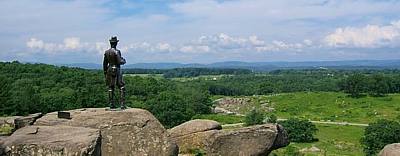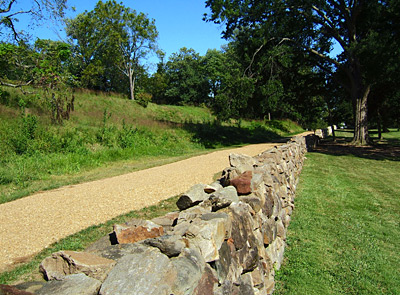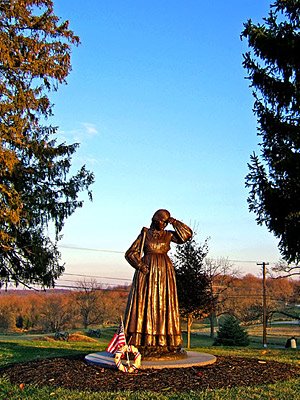A search for the word "Thanksgiving" in the Official Records revealed some interesting results. After reading through the various segments of the record, it appeared that people of the time primarily employed the term "thanksgiving" for at least three different purposes. Several quotes of course referenced President Lincoln's proclamation concerning a national day of thanksgiving. More frequently, soldiers and commanding officers used the term to express a general feeling of gratitude to The Almighty for victories won and as a plea for future success. For example, after the surrender of the Union garrison at Munfordville, Kentucky, General Braxton Bragg issued the following:
"General Orders,
No. 6.
Hdqrs. Army of the Mississippi
Munfordville, Ky., September 17, 1862
…Tomorrow, September 18, having been specially set aside by our President to be observed as a day of thanksgiving and prayer to Almighty God for the manifold blessings recently vouchsafed to us and to our cause, the general commanding earnestly recommends to the army to devote the day of rest allotted to them to the observance of this sacred duty. Acknowledging our dependence at all times upon a merciful Providence, it is meet that we should m not only render thanks for the general success of our cause and of this campaign, but should particularly manifest our gratitude for a bloodless victory instead of a success purchased with the destruction of life and property. Braxton Bragg, General, Commanding"
General Robert E. Lee likewise issued similar orders following Confederate victory at Chickamauga.
"General Orders
No. 89.
HDQRS. Army of Northern Virginia,
September 24, 1863
The Commanding General announces to the army, with profound gratitude to Almighty God, the victory achieved at Chickamauga by the army of General Braxton Bragg.
After a fierce and sanguinary conflict of two days, the Federal forces under General Rosecrans were driven, with heavy loss, from their strong positions, and, leaving their dead and wounded on the field, retreated under cover of night on Chattanooga, pursued by our cavalry.
Rendering to the Great Giver of Victory, as is most justly due, our praise and thanksgiving for this signal manifestation of His favor, let us extend to the army that has so nobly upheld the honor of our country the tribute of our admiration for its valor, and sympathy for its suffering and loss.
Invoking the continuous assistance of Heaven upon our efforts, let us resolve to emulate the heroic example of our brethren in the south, until the enemy shall be expelled fro our borders and peace and independence be secured to our country.
R. E. Lee, General"
Even as fierce a general as Nathan Bedford Forrest followed suit.
"General Orders
No. 44.
HDQRS. Forrest’s Cavalry Department
Tupelo , May 14, 1864
The Major-General commanding, devoutly grateful to the providence Almighty God so signally vouchsafed to his command during the recent campaign in West Tennessee, and deeply penetrated with a sense of our dependence upon the mercy of God, in the present crisis of our beloved country, requests that military duties be so far suspended that divine service may be attended at 10 a.m. on to-morrow by the whole command. Divine service will be held at these headquarters, to which all soldiers who are disposed to do so, are kindly invited. Come one, come all. Chaplains in the ministration of the gospel are requested to remember our personal preservation with thanksgiving, and especially to beseech the Throne of Grace for aid in this our country’s hour of need.
By order of Major-General Forrest:
W. H. Brand, Acting Assistant Adjutant-General."
Union men employed the term thanksgiving in a like manner. Toward year's end in 1863, the Union's General-in-Chief sent the following to General Grant.
"War Department
Washington, November 26, 1863-11:15am
I congratulate you and your army on the victories of Chattanooga. This is truly a day of thanksgiving.
H. W. Halleck, General-in-Chief."
A few month's earlier, President Lincoln would give a similar message to the people asking for a day of prayer and thanksgiving.
"Executive Mansion,
Washington, May 9, 1863.
To the Friends of the Union and Liberty:
Enough is known of the army operations within the last five days to claim our especial gratitude to God, while what remains undone demands our most sincere prayers to and reliance upon Him, without whom all human efforts are in vain. I recommend that all patriots at their homes, in their places of public worship, and wherever they may be, unite in common thanksgiving and prayer to Almighty God.
Abraham Lincoln"
His commanding generals would do similarly.
"General Orders
No. 123.
HDQRS Department of the Ohio
Cincinnati, Ohio, August 5, 1863.
In accordance with the proclamation of the President of the United States, appointing Thursday, the 6th instant, as a day of thanksgiving for the signal advances made by the Union arms toward the suppression of rebellion, ad of prayer that they be continued, to the speedy restoration of peace with a once more united country, the commanding general directs that the day be kept sacred for these purposes by the forces under his command, and, abstaining so far as is practicable from all military business or movements, they observe this day in a manner worthy of the victories that have been granted us and of the cause we have espoused.
By command of Major-General Burnside:
Lewis Richmond, Assistant Adjutant-General."
On several occasions, Thanksgiving as a holiday became intertwined with the conflicts of the day. In one instance, its recognition served as a litmus test for loyalty to the Union.
"Lexington, April 25, 1865-7 p.m.
Major-General Dodge:
I have the honor to acknowledge the receipt of telegram of this date inquiring by what authority I closed loyal man’s church, and what are the reasons for such orders, to which I would respectfully answer that I do not think I have closed a loyal man’s church. My reasons for closing the Methodist Episcopal Church South, of this place, are briefly these: On the 7th of April, from the well-known disloyalty of the churches of this place, I issued a post order that on the next Sabbath the pastors of the churches should return thanks for the late victories and prospect of peace. The pastor of the Methodist Episcopal Church South did not do so. I passed the matter unnoticed until the evening of the 15th instant, when, not having opened or caused his church to be opened for the Thanksgiving service, in accordance with the proclamation of His Excellency Governor Fletcher, I informed that pastor that I should take the keys of the church until it could be occupied by a loyal preacher. I hope the general commanding will allow me the privilege of sustaining this action as a proper military necessity.
I have the honor to be, general, very respectfully, your obedient servant,
B. K. Davis, Major, Comdg. Fourth Sub-District, Central Division of Missouri"
On another occasion, the celebration of Thanksgiving became a point of conflict between a commander and his subordinate.
"Baltimore, November 21, 1864-1:15p.m.
General Townsend, Assistant Adjutant-General:
I hope the permission, given by Hon. Mr. Dana., Assistant Secretary of War, to the Secessionists of Baltimore to feast the rebel prisoners in hospital will be withdrawn. I was not consulted. Had I been I would have objected to the making of such a request. The permission will be construed as a license to make manifest once more, the disloyalty, now completely cowed, in this city. I beg the sleeping fiend may be let alone.
Lew. Wallace, Major-General, Commanding.
---
Adjutant-General’s Office
Washington , November 21, 1864.
Maj. Gen. L. Wallace, U.S. Volunteers,
Commanding Middle Department, Baltimore , Md. :
Your dispatch in relation to feast to rebel soldiers has been shown to the Secretary of War. The request which was granted was that Union Ladies’ Committee might be authorized to receive contributions for rebel prisoners, as well as for our own men, all to be distributed by the Union Committee. No political demonstration was contemplated, and it is within your power to stop anything which would lead to such demonstration. The Secretary sees no objection to supplies for Thanksgiving being received and distributed to rebel prisoners by our Union Committee, provided our own men receive an equal share of all the contributions with the other prisoners. Acknowledge receipt. E. D. Townsend, Assistant Adjutant-General.
---
Headquarters Middle Department
Baltimore , November 21, 1864.
Capt. Oliver Matthews,
Assistant Adjutant General, New York City :
A Thanksgiving dinner has been provided for the soldiers at each of the hospitals here. The ladies are also making arrangements to contribute additional supplies. Therefore, those so kindly offered by their New York friends will not be needed.
Saml. B. Lawrence, Assistant Adjutant-General."
The following quote, again as related to conflict, speaks for itself.
"Headquarters District of Southeastern Missouri,
Pilot Knob, Mo. , November 26, 1863.
Capt. V. Preuitt, Bloomfield,
McRae was reported at Doniphan, with a few hundred rebels, on Monday last, and was contemplating a raid either on Bloomfield or Patterson. He may move on you. If he does, he will only give the gallant First Missouri boys one more opportunity of demonstrating that they can’t be whipped. We shall re-enforce you from Cape Girardeau and Greenville , if you need. Keep me constantly advised, and, if you get in trouble, press every man, horse, and gun within reach, and give the rascals such a Thanksgiving welcome as the survivors will be apt to remember.
Clinton B. Fisk, Brigadier-General"
Finally, this quote notes both a plea to offer thanks and a recognition of the dreadful toll taken by this catastrophic war.
"General Orders
No. 4.
Headquarters Fourth Army Corps,
Greenville , East Tenn. , April 13, 1865.
The glorious success of the national arms under Lieut. Gen. U. S. Grant being no longer a matter of any doubt, the army under his command having killed, wounded, captured, and forced the capitulation of the entire principal army of the rebels, including their commander-in-chief, to-morrow, which is the day appointed by the War Department for the raising of the old flag over Fort Sumter, where it was first insulted and pulled down by insolent traitors, will be kept as a holiday and a day of thanksgiving in this corps. A salute of 100 guns will be fired at 12 m. under the direction of Major Goodspeed, chief of artillery. All military duty, excepting necessary police and guard duty, will be suspended. It is recommended that chaplains of regiments hold service in their respective places of worship to render thanks to Almighty God for His goodness and mercy in preserving us a nation and giving us this great victory over our enemies. Let us in our thankfulness remember in tears the many brave men who have fallen at our sides in this great and terrible war. Who among us has not lost a brother, a relative, or a dear comrade? Let us reflect, and we may profit by doing so, that great national, as great personal, sin must be atoned for by great punishments.
By command of Maj. Gen. D. S. Stanley:
WM. H. Sinclair, Assistant Adjutant-General."
Sincerely,
Randy
Please visit my primary site at
www.brotherswar.comAll original material Copyright © 2006. All Rights Reserved
 Edwin Forbes January 25, 1863
Edwin Forbes January 25, 1863












